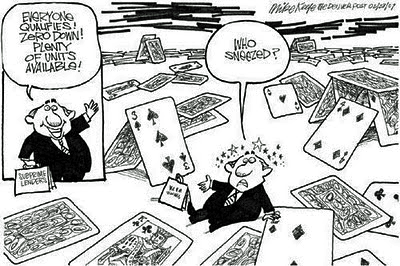Are you facing foreclosure? Has someone advised you to do a short sale in lieu of foreclosure? Well, be careful, there could be a lot of problems down the road for you if you took out an equity loan to pay off debts or buy goods such as a car, boat, furniture or other such items.
Whereas California is a nonrecourse state, meaning lenders cannot pursue borrowers for unpaid balances on home-purchase loans. However, home loans not used for the purchase – home equity lines of credit and second loans taken out after purchase – are recourse loans, which means lenders are legally entitled to collect the unpaid balance. Depending on the type of loan, they have four to six years to pursue borrowers.
Refinanced mortgages do become recourse loans, but in California a nonjudicial foreclosure – the most common kind – eliminates the borrower’s liability to the lender that carried out the foreclosure, which is generally the main lender. A second lender for a nonpurchase loan, however, still has “recourse,” or the right to pursue the borrower.
The problem becomes that in the normal course of business, when you take out an equity loan, you sign a promissory note. That note is a promise to pay the lender, regardless if your property is sold as a short sale or sold in foreclosure. In short you may be stuck to pay off your note that you signed when you got your equity loan. This is what is called a recourse loan. Ouch, it can hurt.
Millions of borrowers do have recourse loans that they took out after purchase, which means lenders have a legal right to pursue them for unpaid balances.
In California during the boom real estate years – 2005 to 2007 – homeowners took out 2.88 million home equity lines of credit and 1.18 million nonpurchase second loans, according to First American CoreLogic, which tracks loan data. The total was 4 million such recourse loans totaling $485.3 billion.
Some experts think lenders may pick whom to pursue by probing defaulted borrowers’ net worth.
Rick Harper, director of housing at Consumer Credit Counseling Services of San Francisco, which staffs the federal HOPE for Homeowners hot line, said his workers tell borrowers who are considering default that their second loans could make them liable to debt collection.
“Depending on what the holder of that note wants to do, it can make their (the borrowers’) life miserable,” he said. “Most of the (lenders) do an asset test to see if there’s anything there. They can run credit reports, use investigative services, get their hands on the applications they used when they applied for a loan.” Applications for loan modifications and short sales also require disclosure of assets.
Most of this story was taken from an excellent article in the San Francisco Chronicle.
To read the full story Click Here”
John J. O’Dell GRI, SFR
Real Estate Broker
Looking for property in Nevada County? Click Here
